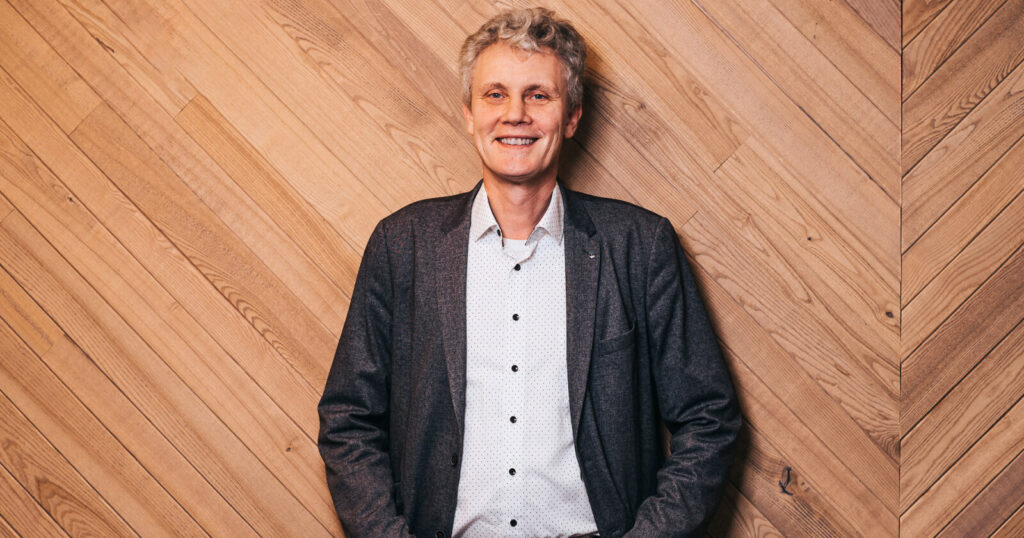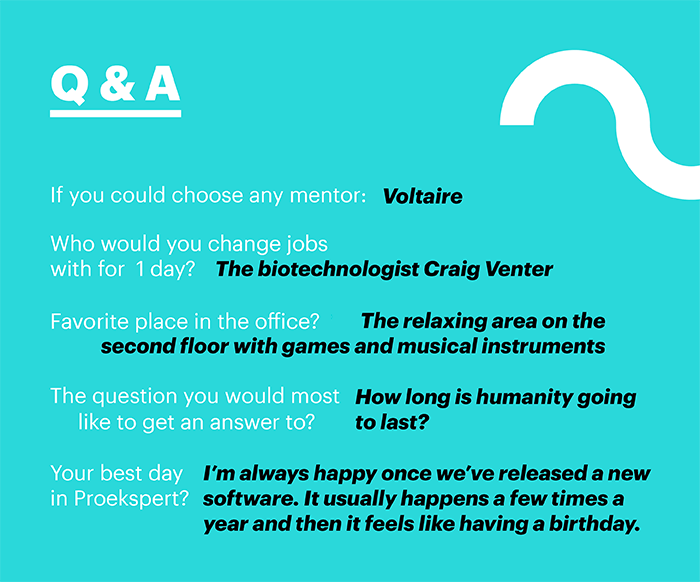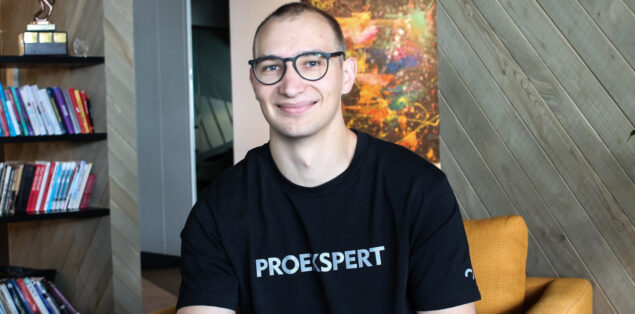Vambola Kotkas: A nature lover absorbed in technology
Vambola Kotkas, one of the creators of Proekspert, is a man of profound thought and good deeds. He was happy to share his thoughts on the co-dependence of nature and technology.

Vambola is a man of few words, as one can tell immediately upon meeting him. He is a man of profound thought and good deeds, whose gaze seems to wander beyond the horizon. Even though he is someone who cares deeply for nature and the planet we live on, he is entirely absorbed in the world of technology. As one of the creators of Proekspert, he claims to have been one of the last people to get a mobile phone in Estonia. He was happy to share his thoughts on such a seemingly contradictory occurrence and other aspects of his understanding of the co-dependence of nature and technology.
Following his curiosity
The combination of technology and nature has surrounded Vambola ever since he was a young boy. Even though he grew up in a city, he spent a fair amount of time with his grandparents who lived outside the city. Driving a tractor and haymaking were familiar to him. He had a bicycle which he enjoyed repairing and making it look and function better than others. His love for tinkering, combined with the influence of his parents’ engineering background, eventually led Vambola to take an interest in technology and the way machines work.
“Back then we didn’t have the internet and you couldn’t buy ready-made things. It was all vice versa. Nowadays, some wonder why there’s a huge garage in the yard of the old country house they’re considering buying. That’s because in the old days everyone used to go to the countryside over the weekend to repair their car. There just weren’t any car service establishments.”
The path to the world of technology was somewhat logical for Vambola. He describes his interest in transforming from machinery to development simply by being curious. “I find everything interesting. IT development is complicated and things like problem solving and computers have always driven me.” He recalls the moment when he first got the chance to explore the piece of technology which today is his main tool at work. “It was our high school physics teacher who got a few computers from Moscow and said that if any of us boys were interested, we could come and take a look at them after class.” Afterwards, they held an interest club in the economics faculty of the Tallinn Institute (now TalTech) where Vambola went to see what “interesting things the smart men did with those computers.”
“There never were any barriers when it came to communicating with people older than me,” he says of what was likely the gateway for him to acquire knowledge more easily.

Nature vs. technology? Or nature and technology?
Vambola does not see it as his love of nature being overtaken by his interest in technology.
For me, it’s all connected, the whole world. Even though when it comes to comparing the complexity of technology and nature, I believe that the former has become even more complex than the latter, especially because certain people get paid for making it so.
“Yet I believe that when comparing the achievements of the two, technology does not shine. Mother Nature has always tried to get by as cheaply and simply as possible – it took billions of years to create multicellular organisms. It was fine with unicellular ones for a very long time. It is only recently, during the last half-billion years, when diverse nature has evolved. And we’ve not been taking good care of it.”
His attitude towards the rapid advancement of technology and mass production is described quite well by the fact that he claims to be one of the very last people in Estonia to own a mobile phone.
“Everywhere I went they were asking for my mobile phone number, and when I told them to leave it blank they said that their system does not accept it. So that’s why I eventually got one, but I still tend to forget it at home. I just think that whoever needs me will eventually find me.”
He says he doesn’t want to become one of the smartphone zombies who can’t get by without staring at the tiny bright screen. He also says he doesn’t watch television. “The goal of technology is to serve humans. Television, for example, does not serve us, because it helps you waste time you don’t actually have.”
When asked about the most useful piece of technology that has been invented recently, Vambola takes a long pause to think and eventually names the world wide web. So, does this mean that the technology sector is going downhill?
“There is a tendency to produce stuff of low quality. The pride of creating a masterpiece is starting to fade, and the mass production of devices with low endurance prevails. And all of that just so you could get a new product out fast enough.”

Will it change?
“Well, luckily it’s a topic close to the heart for many of us,” he says. “I just wish technology would become more reliable in the long term.”
Fortunately, technology keeps on developing and the next great breakthrough just might transform the way things are produced.
“Thanks to advancements, a lot of cameras and sensors have become quite small and cheap to manufacture. Soon the same will happen with engines and other machines like 3D printers. Right now, 3D printing is mainly used to save on transportation – companies print parts for planes and other small details. Ordering just one piece from overseas is expensive but printing it on the spot is more affordable. Even though making just one (on a per-unit basis) is more costly than mass production, I still think one day 3D printing will become more popular and thus cheaper.” This, according to Vambola’s theory, might lead to everyone having a small factory in their home, where they might produce simple household items. It is already possible with a bit of technological knowledge. As the cost of fuel rises and transport becomes more expensive, mass production will become less reasonable.
“Also, people want to have something authentic, and by using the 3D printer they’ve got it covered. So, I’m sure this will become the next new breakthrough that changes the way the world works. But only time will tell when exactly.”
Ours is an interesting era: living on the threshold of something groundbreaking. Yet unsurprisingly, Vambola does not have unlimited time to philosophize, since his contemplation is interrupted by a coworker announcing the occurrence of an IT wildfire in one of the Proekspert’s departments, and Vambola is the only one who can save them. The Princess Developer, as he calls himself with a sly smile on his face, returns to his galaxy of technology while not forgetting his affection toward nature.
3 items that characterize Vambola as a person
- ID card – it symbolizes Estonia’s dominance in e-solutions and services. It’s also recognized globally and that’s something Vambola highly appreciates.
- Photograph of the President of Estonia – Vambola is a law-abiding and patriotic man, so the picture of the official representative of our country reminds him of his values.
- A huge cigarette lighter – Vambola supports the theory that the human mind started developing after the discovery of fire. Besides the symbolic meaning of this item, Vambola says it’s a good lighter to loan someone because there’s a very high probability they’re going to bring it back.

What they said:
Urmas
“Vambola is like a mad scientist from a cartoon. He can dive into deep theoretical and technical contemplations in the middle of some small talk about the meaning of life, global warming, or women. Or any topic. And the really cool thing about it is – he would probably be able to implement his crazy ideas in reality. If only he wanted. Or had time for it.”













